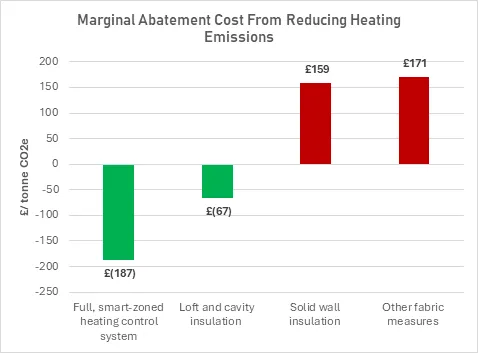As we strive towards a sustainable future and hitting critical net zero targets, heating controls are playing a crucial role in improving the energy efficiency of our homes is, by allowing consumers to regulate energy consumption while reducing carbon emissions, improving overall efficiency of heating systems and giving homeowners an incentive with more power in reducing their energy bills.
We’re debunking some of the common misconceptions about the role of smart heating controls in the transition to low carbon heating, so you can be confident when investing in and installing these energy efficiency measures.
MYTH 1: Smart heating controls do not significantly impact energy savings
Smart heating controls are designed to optimise energy use by providing efficient scheduling and personalised settings to suit different needs in the home. The ability to adjust heating patterns based on occupancy, user preferences and weather conditions can lead to substantial energy savings.
For example, by using zoned smart heating controls, temperatures can be controlled room-by-room, reducing energy consumption and saving money on bills by not heating up rooms not in use. Smart controls also monitor and learn user behaviour patterns and adjust heating schedules to avoid unnecessary energy consumption when the home is unoccupied, or during periods where demand is lower.
Wiser offers a range of both thermostat and multi-room kits, and each kit is buildable, so more zones can be created over time with additional Smart Radiator Thermostats and Smart Room Thermostats.
Remote access also allows homeowners to adjust heating systems from anywhere ensuring optimal energy usage even when people are away from home.
MYTH 2: Smart heating controls are not compatible with all types of heating systems
Heating controls work with most domestic central heating boilers - if a heating system has a standard thermostat or programmer, this is a good indication that your system will be compatible. Smart controls also work alongside heat pumps, plus communal and district heating systems.
Smart thermostats by Wiser are compatible with almost all heating systems, the online Product Selector can be used to check compatibility and find the perfect Wiser Kit for the job.
MYTH 3: Smart heating controls are complicated to install and program
Implementing new technology in the home can be daunting and this can deter homeowners from exploring the benefits of smart heating controls. Modern heating control systems are designed with user-friendly interfaces and most systems will come with a step-by-step guide or include online tutorials to simplify the installation process. By embracing new technology, homeowners can reap the benefits of the convenience and control offered by smart heating controls.

Wiser has an easy-to-install app, packed full of features and benefits.
The Wiser system combines smart features, measurable insights, app control, and voice assistant integration to provide a complete home heating solution. Plus, as all the products are connected, it's easy to grow and adapt your system as your home demands. Wiser products also use a standard wall plate, so it really is as simple as unscrewing your old controller and screwing in your new Heat Hub.
Consumers can use the Wiser Find an installer tool on the dedicated website to access a fully trained network of installers, so they can feel confident that their system is installed correctly and ready to go. To claim your spot in our searchable network of installers, complete the free Wiser Approved training. Find out more now.
MYTH 4: Smart heating controls are not cost-effective
Drayton by Schneider Electric have developed a marginal abatement cost curve (MACC) to compare the cost of installing heating controls against other energy efficiency measures.
The research shows that for the average UK household, a fully zoned smart heating control system can save £187 per tonne of CO2e abated. This means that the system not only reduces CO2e emissions but also creates significant bill savings over its lifetime thanks to its short payback period. This makes a fully zoned smart heating control system one of the most cost-efficient ways to cut carbon emissions – even more cost-efficient than loft and cavity insulation. You can read the full article about the MACC findings.
With a Wiser system, homeowners can monitor energy use with features like Insights and the Heat Report. Wiser, Ofgem, BEAMA, and Salford University discovered during combined research that households can save up to 30% on annual bills by upgrading a basic thermostat to a smart heating system by Wiser. A smart thermostat delivers a return on investment relatively quickly, whilst significantly impacting energy savings.

Related Reading
Drayton stockists near you
Are you an installer?
Check out Drayton Rewards+, our new and improved loyalty scheme that gives you more. Sign up free now to start earning points and access free training!
Sign up today

